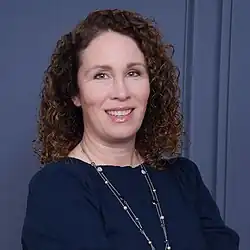Tara J. Yosso

Biography
Tara J. Yosso is a professor at the University of California, Riverside.[1] Her research and teaching focus on critical race theory and critical media literacy, with an emphasis on educational access and opportunity.[2]
Selected publications
Yosso's dissertation, A Critical Race and LatCrit Approach to Media Literacy: Chicana/o Resistance to Visual Microaggressions[3], linked racial microaggressions, stereotype threats, and the intersectionality of racialization for Latina/o students in film portrayals. Her 2009 Harvard Educational Review article,[4] written with William Smith, Miguel Ceja, and Daniel Solórzano, continued this analysis of microaggressions in a critique of the assimilationist models used in higher education student affairs and Latina/o educational experiences.
Her 2006 book, Critical Race Counterstories along the Chicana/Chicano Educational Pipeline,[5] applied this method to examine Chicana/o experiences from elementary through graduate school. In 2008, the American Educational Studies Association awarded Critical Race Counterstories along the Chicana/Chicano Educational Pipeline the Critic's Choice Award.[6]
Her article, “Whose Culture has Capital? A Critical Race Theory Discussion of Community Cultural Wealth”[7] questions deficit interpretations of Pierre Bourdieu and cultural capital theory.[8]
Legacy
In 2022, Yosso was one of seven scholars/activists recognized by the Color of Change organization’s 2022 Inaugural Black History Now Awards. The Color of Change organization named the Award for Excellence in Counter-storytelling in Education award after her.[9]
Selected work
- Solórzano, D.G. & T.J. Yosso. (2002). “Critical Race Methodology: Counter storytelling as an Analytical Framework for Educational Research.” Qualitative Inquiry 8(1), 23–44
- Solórzano, D.G., M. Ceja, & T.J. Yosso. (2000, Winter/Spring). “Critical Race Theory, Racial Microaggressions, and Campus Racial Climate: The Experiences of African American College Students.” Journal of Negro Education 69(1/2), 60–73
- Yosso, T.J. & D.G. García. (2007). “‘This is No Slum!’: A Critical Race Theory Analysis of Community Cultural Wealth in Culture Clash’s Chavez Ravine.” Aztlán: A Journal of Chicano Studies 32(1), 145–179
- García, D.G., & T.J. Yosso. (2013). “‘Strictly in the Capacity of Servant’: The Interconnection Between Residential and School Segregation in Oxnard, California, 1934-1954.” History of Education Quarterly 53(1), 64–89
- Yosso, T.J., W.A. Smith, M. Ceja, & D.G. Solórzano. (2009, Winter). Critical Race Theory, Racial Microaggressions, and Campus Racial Climate for Latina/o Undergraduates. Harvard Educational Review 79(4), 659–690
- Yosso, T.J. (2002). “Critical Race Media Literacy: Challenging Deficit Discourse about Chicanas/os.” Journal of Popular Film and Television 30(1), 52–62
- Yosso, T.J. & D.G. García. (2010). “From Ms. J. to Ms. G.: Analyzing Racial Microaggressions in Hollywood’s Urban School Genre.” In, B. Frymer, T. Kashani, A.J. Nocella II, & R. Van Heertum (eds.). Hollywood’s Exploited: Public Pedagogy, Corporate Movies, and Cultural Crisis (pp. 85–103). New York: Palgrave Macmillan.
- Yosso, T.J. & C. Benavides Lopez. (2010). “Counter spaces in a Hostile Place: A Critical Race Theory Analysis of Campus Culture Centers.” In, L.D. Patton (Ed.). Culture Centers in Higher Education: Perspectives on Identity, Theory, and Practice (pp. 83–104) Sterling, VA: Stylus.
- Smith, W.A., T.J. Yosso, & D.G. Solórzano. (2006). “Challenging Racial Battle Fatigue on Historically White Campuses: A Critical Race Examination of Race-Related Stress.” In, C.A. Stanley (Ed.). Faculty of Color: Teaching in Predominantly White Colleges and Universities (pp. 299–327). Bolton, MA: Anker Publishing, Inc.
- Yosso, T.J. & D.G. Solórzano. (2005). “Conceptualizing a Critical Race Theory in Sociology.” In, M. Romero & E. Margolis (eds.), The Blackwell Companion to Social Inequalities (pp. 117–146). Oxford, UK: Blackwell Publishing.
- García, D.G., T.J. Yosso, & F.P. Barajas. (2012). “‘A Few of the Brightest, Cleanest Mexican Children’: School Segregation as a Form of Mundane Racism in Oxnard, CA, 1900-1940,” Harvard Educational Review 82(1), 1–25.
- Yosso, Tara J. (2005). "Whose culture has capital? A critical race theory discussion of community cultural wealth" (PDF). Race Ethnicity and Education. 8 (1): 69–91. doi:10.1080/1361332052000341006. S2CID 34658106.
References
- ^ University of California Riverside website, Profiles, retrieved November 7, 2024
- ^ Clark University website, Expert on critical race theory to deliver Clark’s Gurel lecture, article dated March 18, 2019
- ^ "A critical race and LatCrit approach to media literacy: Chicana /o resistance to visual microaggressions - ProQuest". www.proquest.com. Retrieved 2025-04-02.
- ^ Yosso, Tara; Smith, William; Ceja, Miguel; Solórzano, Daniel (2010-01-29). "Critical Race Theory, Racial Microaggressions, and Campus Racial Climate for Latina/o Undergraduates". Harvard Educational Review. 79 (4): 659–691. doi:10.17763/haer.79.4.m6867014157m707l. ISSN 0017-8055.
- ^ Yosso, Tara J. (2006). Counterstories along the Chicana/Chicano Educational Pipeline. New York, New York: Routledge. Archived from the original on 2015-05-18. Retrieved 11 May 2015.
- ^ "Whose Culture has Capital? A Critical Race Theory Discussion of Community Cultural Wealth". American Educational Studies Association. Retrieved 19 Aug 2019.
- ^ Yosso *, Tara J. (2005-03-01). "Whose culture has capital? A critical race theory discussion of community cultural wealth". Race Ethnicity and Education. 8: 69–91. doi:10.1080/1361332052000341006. ISSN 1361-3324.
- ^ Yosso, Tara J. (2005). "Whose culture has capital? A critical race theory discussion of community cultural wealth" (PDF). Race Ethnicity and Education. 8 (1): 69–91. doi:10.1080/1361332052000341006. S2CID 34658106.
- ^ Ohio State University website, 2023 Conference Presenters